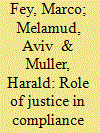| Srl | Item |
| 1 |
ID:
105209


|
|
|
| 2 |
ID:
149558


|
|
|
|
|
| Publication |
United States, Alpha Editions, 2008.
|
| Description |
vii, 378p.hbk
|
| Standard Number |
1584873337
|
|
|
|
|
|
|
|
|
|
|
|
Copies: C:1/I:0,R:0,Q:0
Circulation
| Accession# | Call# | Current Location | Status | Policy | Location |
| 058919 | 355.17095491/SOK 058919 | Main | On Shelf | General | |
|
|
|
|
| 3 |
ID:
135246


|
|
|
|
|
| Summary/Abstract |
Compliance is a central concept in both the study and practice of international relations, and the body of literature is correspondingly extensive. Although justice has already been shown to play an important role in international negotiations, its potential impact on actors’ compliance behavior has not been sufficiently explored to date. We examine the relationship between the two concepts, and posit that actors’ perceived justice considerations with a regime influence their compliance behavior. To illustrate the importance of including justice considerations in the study of compliance, we investigate Germany’s behavior as a member of the Nuclear Non-Proliferation Treaty during the 1960–80s. The empirical illustration exemplifies how a member’s justice contentions, borne of an unjust regime, can lead to contested compliance and regime conflict. The case illuminates the need to broaden our understanding of compliance and its complexity in both conceptual and practical terms.
|
|
|
|
|
|
|
|
|
|
|
|
|
|
|
|
| 4 |
ID:
087445


|
|
|
|
|
| Publication |
2009.
|
| Summary/Abstract |
When and why do states transfer nuclear technology, materials, and knowledge to other states for peaceful purposes? This question is important given the recent finding that countries receiving nuclear aid are more likely to pursue and acquire nuclear weapons. I argue that countries provide civil nuclear assistance for three strategic reasons: to strengthen their allies and alliances, to strengthen their relationship with enemies of enemies, and to strengthen existing democracies and bilateral relationships with these countries (if the supplier is also a democracy). I test these arguments using statistical analysis and a new data set on more than 2,000 bilateral civilian nuclear cooperation agreements signed between 1950 and 2000. The findings offer robust empirical support for my argument and very little support for the competing explanation rooted in norms and nonproliferation. This article enhances scholarly understanding of how and why nuclear weapons spread and encourages further research on the supply side of nuclear proliferation. It also has broad implications for the literatures on norms and international cooperation.
|
|
|
|
|
|
|
|
|
|
|
|
|
|
|
|
| 5 |
ID:
170926


|
|
|
|
|
| Summary/Abstract |
Britain and Canada, two major nuclear Cold War actors, refrained from establishing close nuclear ties with Israel from 1958 to 1974, despite Israel’s consistent interest in importing civilian nuclear technology. This was true both before and after the nuclear Non-Proliferation Treaty came into force in 1970, even though the treaty allowed for the export of safeguarded nuclear reactors. In comparison, the other two leading nuclear exporters of the period, France and the United States, were much more involved in the initial stages of the Israeli nuclear programme, exporting research reactors to Israel in the 1950s. How did Britain and Canada view Israel’s military and civilian nuclear programme from 1958 to 1974? How did they form their nuclear export policy towards Israel and what considerations motivated them? This analysis examines these questions using archival material from British and Canadian archives.
|
|
|
|
|
|
|
|
|
|
|
|
|
|
|
|